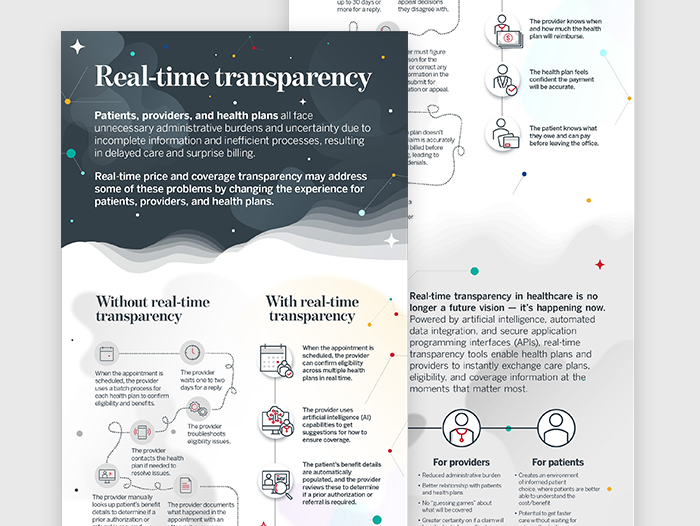Auto logout in seconds.
Continue LogoutIn a recent Nature article, Mariana Lenharo claimed that the healthcare industry is on the cusp of an "AI revolution." Advisory Board's Ty Aderhold and John League want you to know how widespread implementation of artificial intelligence (AI) could impact healthcare stakeholders — and share resources to help you navigate AI adoption.
Healthcare is on the cusp of an 'AI revolution'
With myriad applications and potential, AI is quickly becoming a vital tool in healthcare settings. So far, FDA has authorized over 500 AI-based tools that are used in medicine. Currently, most of these tools are used in medical imaging to do things like enhance images, measure abnormalities, or signal when test results require follow-up.
While some clinicians and medical professionals are optimistic about AI's potential, many are still hesitant to back its implementation, citing concerns tied to quality, safety, and efficiency. Unfortunately, these doubts can often delay or prevent the implementation of the latest AI tools.
However, there is growing excitement around an approach often referred to as generalist medical AI, which relies on models trained on large data sets, similar to the models that power AI chatbots like ChatGPT. Once these models have been fed large data sets of medical images and text, they can be trained for a variety of tasks, instead of one specific function.
According to Lenharo, "[t]hese generalist models would act more like a physician, assessing every anomaly in the scan and assimilating it into something like a diagnosis."
Many experts have noted that these generalist models could address some of the current limitations of AI tools. And while these tools will not replace physicians, they have the potential to outperform them in certain situations. "The real goal to me is for AI to help us do the things that humans aren't very good at," said radiologist Bibb Allen, CMO at the American College of Radiology Data Science Institute.
Ultimately, there's still a lot that needs to happen before these tools can be widely implemented in real-world settings. The path to seamlessly incorporating AI into healthcare is riddled with barriers — but the technology holds significant promise. Proponents envision a future where healthcare professionals learn to effectively use AI to boost efficiency and improve care outcomes.
Jordan Perchik, the president and co-founder of Artificial Intelligence in Radiology Education, views the role of AI as steadily ascending in the medical world. Perchik underscored the growing need for practitioners to learn how to use AI. "A lot of the work that we do is demystifying AI and managing the hype versus what the reality of AI is," he said. (Lenharo, Nature, 10/24)
How to prepare for healthcare's 'AI revolution'
By Ty Aderhold and John League
AI is essential to healthcare's future. As the healthcare industry starts to embrace AI, stakeholders face a critical juncture.
While the widespread adoption of AI in healthcare may still be years away, stakeholders must prepare now. Here's our take on how the "AI revolution" will impact vendors and providers — and our top resources to help them navigate the widespread adoption of AI and seize the opportunities that lie ahead.
How will the 'AI revolution' impact vendors?
Clinical application bloat is a real concern for providers. The market for AI solutions is still relatively immature and fractured, so we should expect serious consolidation and more failures than successes in coming years.
That may also undermine the platform play, where a vendor creates an ecosystem of diverse applications that can be accessed through a single interface. Compared to the possibilities of more general clinical AI, these platforms seem like a poor substitution because they still require validation of many different tools, and the costs of maintaining and updating individual applications.
What can they do to prepare?
In such a volatile, changing market, vendors need to closely align their offerings to customers' needs and understand what senior leaders are looking for in AI solutions. In this case, that means they need to be able to demonstrate the immediate impact of their offerings and the future potential or more general applicability of those offerings.
Budgets are tight and many health system leaders are aware that the AI landscape is constantly changing, which means vendors must demonstrate how their products will bring a positive ROI for years to come.
How will the 'AI revolution' impact providers?
General medical AI could change the dynamics of care delivery. The organizations best set up for success here aren't healthcare organizations at all but are instead big tech companies like Google and Microsoft.
What will change about the power dynamics and reimbursement for care if big tech becomes an integral part of the diagnosis and treatment of disease in this way? Care delivery organizations may struggle here. Data science expertise is going to become a key target for many providers, as it will be the key to unlocking the ability to use many of these tools.
But for now, the healthcare organizations most prepared to use and benefit from generalist AI models are pharmaceutical and life sciences organizations, as they have the capital, technical expertise, and clear R&D incentives to move in this direction. Even payers, with their vast amounts of clinical data, are better prepared to take advantage of these clinical generalist AI models compared to providers.
What can they do to prepare?
Care delivery organizations are not doomed to falling behind other parts of the industry. To get ahead, these organizations must first take a principled approach to understanding and responding to the difficult challenges that come with AI adoption.
In addition, care delivery organizations need to understand the benefit of an incremental approach to adoption. That is to say – they should begin moving today.
But instead of jumping in and adopting right away, they should be moving on setting up their governance and decision-making processes. This approach should allow them to be prepared for successful long-term adoption as transformational use cases come online.
There's still time to prepare
Generalist medical AI models are further away than breathless predictions or even our own musings may anticipate. This gives providers time to prepare, and other stakeholders time to improve.
It took OpenAI five years to move from their initial GPT-1 model to the introduction of GPT-4. And while training times continue to decrease, the accuracy requirements that will be necessary for general medical AI adoption likely mean it is still years away.
While these generalist models can avoid some of the training issues that have plagued early clinical AI models, they still require external validation. And each time they are repurposed for a new use case they still need to be examined for accuracy and bias.
Even if we are years away from general AI adoption, healthcare organizations need to do the strategy and governance work today.
But the key to success isn't a new AI strategy. Instead, organizations need to understand how to leverage AI to serve their existing strategies. To uncover three ways organizations are approaching AI — and learn which pitfalls to look out for — read our take on AI strategies.
Don't miss out on the latest Advisory Board insights
Create your free account to access 1 resource, including the latest research and webinars.
Want access without creating an account?
You have 1 free members-only resource remaining this month.
1 free members-only resources remaining
1 free members-only resources remaining
You've reached your limit of free insights
Become a member to access all of Advisory Board's resources, events, and experts
Never miss out on the latest innovative health care content tailored to you.
Benefits include:
You've reached your limit of free insights
Become a member to access all of Advisory Board's resources, events, and experts
Never miss out on the latest innovative health care content tailored to you.
Benefits include:
This content is available through your Curated Research partnership with Advisory Board. Click on ‘view this resource’ to read the full piece
Email ask@advisory.com to learn more
Click on ‘Become a Member’ to learn about the benefits of a Full-Access partnership with Advisory Board
Never miss out on the latest innovative health care content tailored to you.
Benefits Include:
This is for members only. Learn more.
Click on ‘Become a Member’ to learn about the benefits of a Full-Access partnership with Advisory Board
Never miss out on the latest innovative health care content tailored to you.




